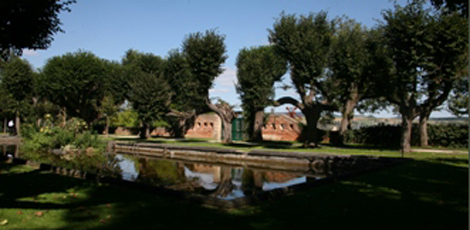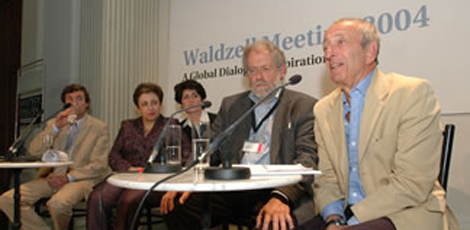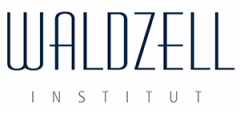Waldzell Meeting 2004
The Search for the Meaning of Life

The objective of the first Waldzell Meeting was to focus attention on the topic of the search for meaning, something that touches all of our lives. By presenting the life-stories of three Nobel laureates, the world’s leading researcher on human happiness, the inventor of the birth-control pill, as well as recognized spiritual authorities and artists of world stature, we sought to offer new and valuable lines of sight into what it takes to create and live a meaningful life. The presenters and participants came to the realization during the course of the gathering: The attempt to shape the future is one of the most powerful ways to give meaning to one’s life. This provided us with the inspiration for the subject of the Meeting 2005.
Executive Summary – Three lessons and five revolutions

It could not be a more glorious September day. The valley is spread out before us, the Danube winds its way below us as we arrive at the Abbey Melk to begin . . . what? What awaits us over the next two days? What has been planned? And what will emerge? What has been prepared? And what will occur spontaneously? The Waldzell Meeting 2004 has been called by the conveners “A Global Dialog for Inspiration.” If the spirit of the morning is an indication, this is less a “meeting” and more an experience, more a verb and less a noun.
We arrive at the parking lot in front of the entrance to the Melk Abbey. They are ready for us. Who is “they?” What is ready? Too many questions, my impatient friend. Quiet your mind. You are here for an experience, yes? Then quiet, and experience the experience.
It is as if someone has been reading your mind. You are directed through the gates to the quiet contemplative space of the Abbey’s garden. There is a tranquil pool of water, a magical sphere with a message projected upside-down onto a mirrored surface, gentle music playing. A reminder to be present and in the moment. A piece of paper carefully folded in a white envelope offers a suggestion. Try looking at a leaf very carefully. Try hearing the sound of your own breathing. Try listening, try looking, try slowing down to the life-speed of this ancient garden.
Down the path a second experience awaits. A series of numbers starting at 80 and ending at 0 wind their way along the garden path. These are the years of your life. Find your current age, then walk your way backward, stopping at each year where a memory speaks to you. You find yourself closing your eyes, remembering. The death of a parent. The birth of a child. Leaving a job, starting a business. Your wedding. College graduation. High school. Go back, winding down the years of your life, getting younger as you walk, until you come at last to your own birth, your arrival at this place. And so it begins.
It ends the next afternoon in Kolomani Hall, with the evening softly falling outside and a sense of peaceful energy within. The room is filled with chairs arranged in a graceful spiral, gradually narrowing down to eleven chairs in the middle for the speakers. Everyone is asked to record their last thoughts–about the event, about the lessons learned, about what they’re taking home with them, about their hopes for the future–on a piece of paper. These are collected; they will be recorded and turned into a book. The book will become a part of the monumental library at Melk Abbey.
Then it is time for last words. It is a benediction of sorts. A microphone moves from speaker to speaker. What remains to be said? Each of the speakers has had a turn from the stage, in a panel, in individual gatherings.
All that remains are simple words spoken from the heart. Thanks yous–to the organizers and the attendees, to the Abbey. Appreciation–for the opportunity to participate, for the thoughtful exchange of ideas and the heartfelt exchange of emotions. A recognition– that the Waldzell gathering was a leap of faith, itself an expression of hope, and a living example of people leading from their hearts, bringing others together to co-create an experience that could touch and change the lives of many. And a wish–that what was started in this two day gathering would live on, that those in attendance would carry with them the seeds of this experience so that fresh flowers of understanding would bloom throughout the year.
The last words are spoken by Andreas and Gundula. No one wants to leave the spiral. No one wants to break the connection. The Waldzell gathering is over. The Waldzell experience continues. Those are the bookend experiences of the two-day gathering–it began in the peaceful calm of the garden and ended in the hopeful expectation of the Kolomani Hall.
But what really happened in the intervening days? If you read the schedule, you’ll see that the program was packed, each hour of each day filled with opportunities to talk and listen, to meet and interact with energetic, smart, committed people. You’ll see times set aside for presentations by some of the world’s most remarkable thinkers and doers–Nobel Prize winning peace advocates and scientists; men and women of courage and understanding; people who have examined and can explain the human heart, the human soul, the human consciousness, the human cell; people who can bring joy to the lives of others and people who can bring meaning to the work of many.
You’ll see times set aside for meals, where table talk and hearty fellowship prevail. You’ll see times set aside for tours of the Abbey, to see the library and witness the sense of history and faith embedded in the very walls and walkways of the place. Other times were reserved for ceremony: A moving concert and candle-lighting ceremony in the Abbey Church, solidifying the common values of the world’s three great religions. Those are some of the things you see if you read the program.
But that doesn’t tell you what really happened, or how it happened, or why it matters. Begin not with the speakers or even with the attendees. Begin with the conveners. The subtitle of the Waldzell Meeting 2004 tells you what they were after: A Global Dialog for Inspiration.
Inspiration!
How do you go about creating a global dialog for inspiration? These conveners knew something special about the art of inspiration. Sparking inspiration is like catching a glimpse of the sun: Nothing is more powerful or ephemeral. You don’t look directly at it–if you do, you run the risk of blinding your eyes from the intensity of the light. Instead, you catch glimpses of it from different angles. You can’t capture inspiration. You invite it and then, rather than seeing inspiration itself, you see how it sparks and sparkles the people it touches. If you want to invite inspiration, you begin with your self. This the conveners understood, for it was Gundula who opened the dialog on the first morning with an honest expression of her own story, of how she had sought not just success or power or position in her life, but had gone off looking for meaning.
The first lesson of the day: If you want to use the power to convene people in a search for inspiration, you have to begin with an honest and an open heart yourself.
The second lesson of the day: the venue matters. A sense of place surrounded the Waldzell gathering. Conferences, retreats, public gatherings often take place in conveniently located, sterile buildings: Hotel ballrooms, formal conference centers, convention halls. If you’re looking for inspiration, you do not go to a hotel ballroom, a conference center, or a convention hall. You go to Melk Abbey, with its quiet garden, its historic library, its contemplative halls, its vaulted assembly rooms, and its invitation of inspiration. The root of inspiration, after all, is “divine guidance.” The third lesson of the day: The context matters. Dialog is the important word: Conversation is how we learn, it’s the way in which we multiply and magnify what each knows but what the other contributes. There is an art to dialog and it was in evidence at Melk Abbey. Dialog needs comfort and safety, it needs good listening as well as good speaking. It thrives on honesty and interchange. Dialog reminds us that we have the most to learn from those who are least like us. And so the Waldzell dialog brought together, by design, a great and thoughtful Muslim voice for peace, a Jewish rabbi with a great mind for understanding, and generous and hardworking Benedictine abbots with the spirit of reconciliation. Natural scientists who understand the atom sat next to social scientists who understand human consciousness. Great musical artists sat next to business thinkers. The whole of such a dialog is greater than the sum of its parts.
And dialog is more than smart talk. Dialog is action: It is an entire hall of people learning to sing together, lifting their voices for fun and learning. It is an entire gathering learning how to cook together, making their own sweet desserts with their own hands, guided by the gentle hands of dirndl-clad local cooks. Dialog is an endlessly long dining table in a medieval hall, lit by candles, laden with sumptuous food and drink and lifted by the sounds and spirit of fellowship.
What the conveners understood, in other words, is that if you want true dialog for inspiration, you must attend to the cardinal points of human experience: Intelligence and instruction, hope and aspiration, joy and empathy, fun and compassion.
That was the vessel for the Waldzell experience. Into that vessel, 11 speakers poured their life’s work and their life’s stories. The setting was at once intense and intimate, personal and universal.
How can you recapture the magic of hearing from the lips of Shirin Ebadi the lesson of human rights and human dignity as told by an Iranian Muslim woman? What does it feel like to have Helen Palmer, the world’s authority on the Enneagram, lead almost 200 people in simultaneous directed meditation. To hear Thomas Hampson, one of the most celebrated baritones in the world, speak with passion and clarity, about the power of freedom that is infused in the spirit of music. Each of the conversations, the formal presentations in the plenary sessions, the panel discussions that followed, and the opportunities for individual dialog opened up a new avenue for insight into the human experience.
Some of the story telling captured in a moment a quality of life that can only be described as inspirational. David Goldberg talking about his work leading a reform Jewish congregation in London to a larger appreciation of community and connection. Anton Zeilinger describing with the art of a poet, the delightful science of quantum physics, a way of understanding reality and our relationship to reality that challenges the mental models of centuries of human understanding. Carl Djerassi describing his intimate history with Vienna and Austria, and his personal journey from world-changing scientist and inventor to world-recognized novelist and playwright. Kary Mullis recalling with laser-like clarity the moment that he saw the scientific breakthrough that would transform the replication of DNA and win him a Nobel Prize. Gunter Blobel describing how what we now know about the cell needs to change how we still think about the evolution of the human species, our human relationships, and our connections to each other. Mihály Csikszentmihályi calming describing how, as a child, his father and mother finally took him on a train to escape Budapest as troops approached the city in the horror of World War II–and how he turned around as the train moved across the bridge, only to see the bridge blown up behind him. He was on the last train to make it out. Those were some of the stories. Then there were personal moments, the kind each of the attendees captured and holds to this day. There was the eminent Rabbi David Goldberg up to his elbows in dough, rolling out the shell for his own hand-made strudel. Thomas Hampson, a marvelous singer and student of music, mischievously leading half the great hall in a round, gradually increasing the speed, turning the song into a high-spirited competition.
Helen Palmer, surrounded by a small group of intensely interested followers, patiently, carefully answering each question about the way the Enneagramm would work for them.
Shirin Ebadi patiently answering questions about life in Iran, coming to this gathering only a few weeks after news reports in the international press carried stories about her home having been broken into in another attempt to frighten her. Anton Zeilinger explaining quantum physics in words anyone can understand, and delighting in the both/and-ness of the new science. Kary Mullis enjoying a glass of wine and outlining his unique perspective on every imaginable topic, from AIDS to global warming.
What do you learn when you’re in the presence of greatness?
We learned what greatness feels like. We all got to be in a field of thought that could only raise our own fields of thought. We got to approach a way of thinking, and more important, a way of being, that celebrates the unique gifts of each human being, and that transforms the lives of all human beings. We got to laugh with these amazing people. We got to eat and drink and talk with them about matters lofty and mundane. We got to see them celebrated in ceremonies where their own stories were inducted into the Melk Abbey library.
We got to glimpse, if only briefly, the way the pieces of the puzzle of life on Earth can sometimes fit together into a seamless fabric of creation, of faith, of intelligence, of hard work, of gifts beyond understanding. We got to realize that when you walk beside giants, you feel a little taller yourself.
And what of me personally?
I accepted the invitation not knowing what to expect. I liked the name, the Waldzell Institute. The first book we reviewed in Fast Company magazine was Hesse’s The Glass Bead Game. I was curious about the place, the people, the intent. I spent the first day at the gathering wondering why I’d been invited–there is no Nobel Prize for magazine editors, even for magazine editors whose creations quickly become the fastest growing business magazine in American history, win multiple awards, from best in design to best overall to magazine editor of the year. Still, none of that stands up to the creation of the birth control pill, for example, or the development of the concept of “flow.” And then, in the quiet of the Abbey, it dawned on me. I wasn’t there as me, as a resume, or even as a personal story. I was there as witness to the birth of something more important. I was present at the creation of something more universal.
Represented in the room were the five revolutions that are defining our lives and creating our future:
* The revolution in belief, culture, and society, reshaping the political and spiritual map of the world.
* The revolution in science and in our understanding of scientific possibility, reshaping everything from the cells of our bodies to the concept of the universe.
* The revolution in consciousness and our ongoing in consciousness and our ongoing search for personal meaning.
* The revolution in art, reshaping our appreciation of freedom, of individual expression, of self-creation.
* The revolution in business and work, reshaping our sense of purpose and our way of both making a living and making our lives.
Those revolutions were present at the Waldzell gathering, represented by the conveners, the speakers, and the attendees. They boxed the compass of our discussions and integrated our various points of view into a single moment of intensity–heat of thought, warmth of spirit. More than that, these intersection perceptions of a future in the making created new understandings and new relationships between people that will live long beyond the two days we spent at the Abbey Melk.
More than anything, the Waldzell experience confirmed in me a belief that I had not yet found the words to express, but that lived in the spirit and purpose of the global dialog for inspiration: If you change the conversation, you will change the future.
Alan M. Webber

